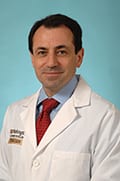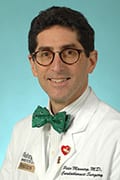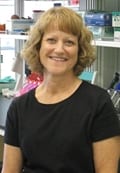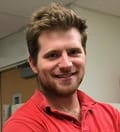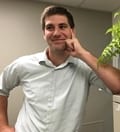Pirooz Eghtesady, MD, PhD, chief of pediatric cardiothoracic surgery and the Emerson Chair in Pediatric Cardiothoracic Surgery at St. Louis Children’s Hospital, manages a vigorous research program that emphasizes interdisciplinary approaches to understanding the pathogenesis of congenital heart disease with particular emphasis on ventricle septal defects, hypoplastic left heart syndrome and aortic stenosis. Research includes clinical and epidemiologic studies to better understand the etiology of these defects. At the same time, translational studies using animal models are under way with the goal of developing clinically applicable protocols for fetal cardiac intervention and surgery, and to better understand the mechanisms underlying in utero evolution of congenital heart defects, as well the significance of maternal reproductive history on babies developing heart problems.
Peter Manning, MD, professor of surgery, investigates process and quality initiatives to improve patient safety and outcomes for hospitalized children. His research interests include, but not are not limited to work with:
- Congenital Heart Surgeons Society. Member surgeon, facilitating enrollment and surgical/publication advisory.
- National Pediatric Cardiology Quality Improvement Collaborative – NPC-QIS. The mission of the NPC-QIC is to improve the outcomes of care for children with cardiovascular disease by creating standards related to care coordination
Anoop Brar, PhD, research instructor, earned her PhD in neuroendocrinology at the University of Edinburgh, Scotland (1983). From 1990 to 2002, she held a faculty position at Cincinnati Children’s Hospital, where her research focused on defining molecular mechanisms in the regulation of the fetal-maternal unit. Her interest in this area has continued in Dr. Eghtesady’s research group, and is directed to determining factors that play a role in the development of congenital heart disease.
Lisa Goessling is the Eghtesady lab supervisor. She joined the lab in 2011 after a long tenure with the Biology Department on the Washington University Danforth Campus. She received a B.S. in biology/medical technology from Southern Illinois University at Edwardsville in 1980 and a B.S. in information management from Washington University in 2003. Lisa manages the day-to-day operations of the lab, helps develop the animal models and performs many of the molecular biology techniques.
Vipul Pharma, PhD, a postdoctoral research associate, has a doctoral degree in cardiovascular developmental genetics from the Institute of Genetic Medicine, Newcastle University, UK. He has a passion for understanding heart development and how it relates to congenital heart defects or cardiovascular diseases.
Nicholas DuPont is a data analyst who works with various aspects of data set management and analysis. He provides advanced statistical analysis in data, applied and factor analysis. Nick is vital in assuring our projects are relevant and powerful from the beginning – at study start up – ongoing and through the end when our project is ready for analysis and publication. He received a master of science degree in biostatistics from Washington University School of Medicine in St. Louis and a bachelor of science in mathematics, with a minor in business administration, from the University of Tulsa, Oklahoma.
Matt Canter joined in 2012 as the STS (Society of Thoracic Surgery) database manager after working a few years as a data analyst for St. Louis Children’s Hospital. Matt’s duties includes managing and updating the STS database, which is used as quality improvement tool to help produce better outcomes for congenital cardiothoracic patients. The STS database, including St. Louis Children’s Hospital’s surgical information and data from other participating hospitals, provides the largest resource of information regarding congenital heart surgery patients in the country.
We have a number of dynamic and innovative medical students, biomedical students, co-ops, clinical fellows and residents who work closely with us on clinical projects and on our basic science bench research.
